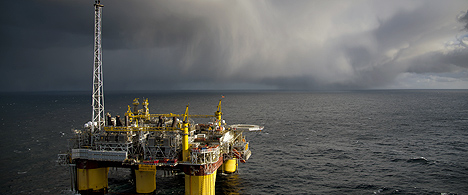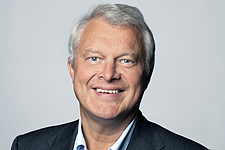
Åsgard B. (Photo: Øyvind Hagen/Statoil)
Øystein Michelsen, Statoil’s executive vice president for Development and Production Norway (DPN), presented the PDO to Ola Borten Moe, Norway’s minister for petroleum and energy.
“The decision to improve recovery from Åsgard is one of the most important we are taking this year to sustain output on the Norwegian continental shelf,” says Michelsen.
“This solution has been made possible through an innovative partnership on the Åsgard licence.”
The PDO represents a quantum leap in technological terms, which could contribute to a substantial boost in recovery factor and production life for a number of gas fields.

Development and Production Norway executive vice president Øystein Michelsen presented the PDO to Norwegian petroleum and energy minister Ola Borten Moe.
(Photo: Trond Isaksen/Statoil)
Subsea compression on Åsgard is expected to improve recovery from the Mikkel and Midgard fields by some 278 million barrels of oil equivalent.
That makes the project one of the most important contributors to new volumes, and provides future opportunities for improved recovery from a number of fields.
Quantum leap
Natural pressure in Midgard and Mikkel will become too low over time to maintain stable flow and a high production profile from the Åsgard B platform in the Norwegian Sea.
To compensate for this decline, Statoil intends to install seabed compressors near the wellheads and so increase the pressure. Wellstreams will be piped in a common line to Åsgard B.
“This represents a quantum leap in subsea technology, and an important step in realising our vision of a complete underwater plant,” says Margareth Øvrum, Statoil’s executive vice president for Technology, Projects and Drilling.

"The subsea compressors on Åsgard represent a major technological advance," says Technology, Projects and Drilling executive vice president Margareth Øvrum.
(Photo: Trond Isaksen/Statoil)
“The technology has a substantial potential for improving recovery,” she adds, and emphasises that it is important for future field development in deep water and Arctic regions.
“Testing and qualifying new solutions is vital to the success of our technological developments,” Øvrum notes. “We have already come a long way, but know that the remaining stretch will be a demanding one.
“Developing technology is always challenging, but we have surmounted technological obstacles before and are confident that we will succeed in doing so again on Åsgard together with our partners.”
She adds that substantial synergy exists between technological qualification on Åsgard and the work being done by Statoil together with operator Shell on the Ormen Lange gas field.
Åsgard’s bright future
Åsgard is a crucial hub on the Halten Bank and a key factor in the Norwegian Sea. Subsea compression from Mikkel and Midgard will safeguard future production from the field, says Michelsen.
Statoil is working continuously on other measures to improve recovery in the same area – including reducing processing pressure, drilling and maintaining wells, and applying innovative solutions.
Åsgard is an important hub in a prospective area, and spare processing capacity which becomes available in its facilities can also be offered to others.
“Our vision is a field which is still producing in 2050 with a recovery factor among the best in the world,” says Michelsen.
The subsea compression development will also expand capacity in the Åsgard Transport pipeline, which carries gas from Norwegian Sea installations to the Kårstø plant north of Stavanger.